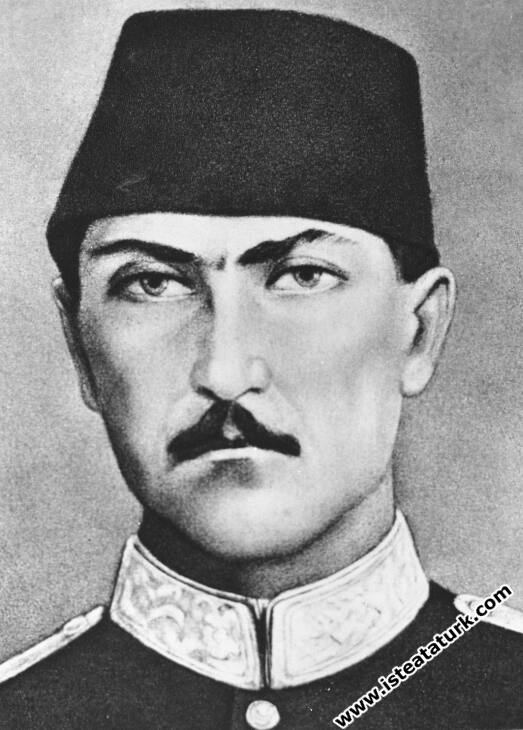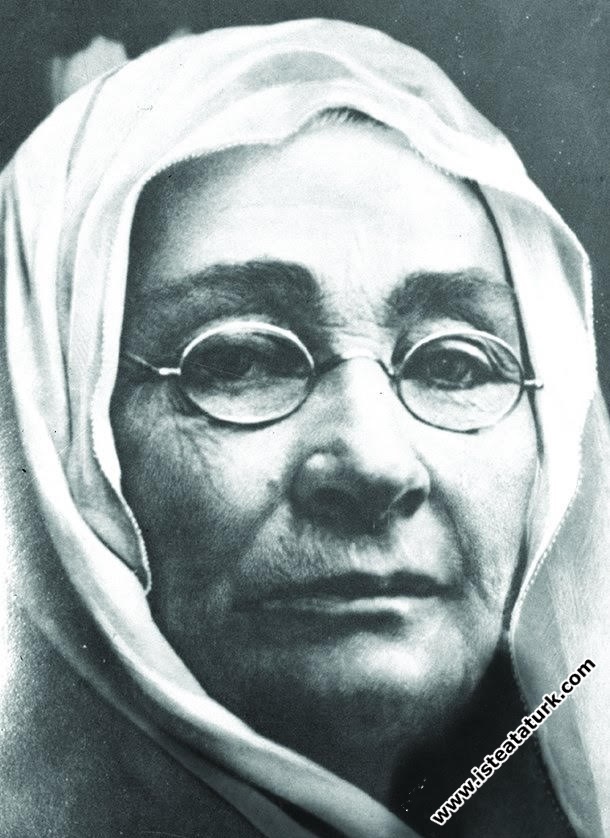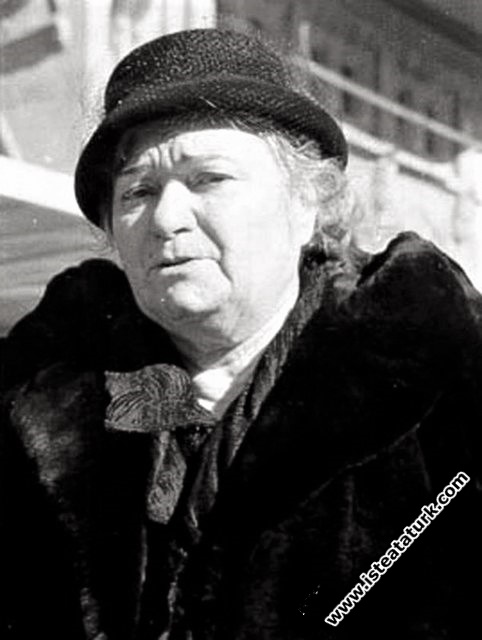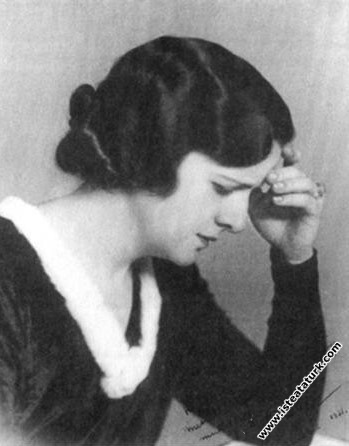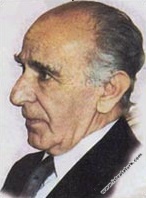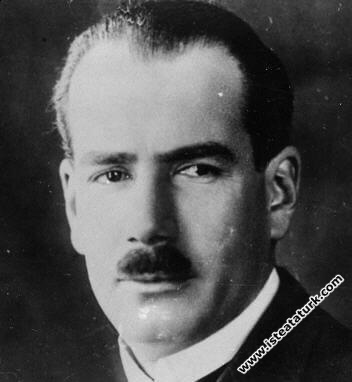
Ruşen Eşref Ünaydın
Character Size
The Life of Rusen Eşref Ünaydın
RUŞEN EŞREF ÜNAYDIN
(March 18, 1892- September 21, 1959)
Ruşen Eşref Bey was the first general clerk of the Turkish Language Institution founded by Atatürk. Ruşen Eşref, who was with Atatürk during the years of the War of Independence, is one of our intellectuals who believed in the Turkish Revolution and walked with Mustafa Kemal for the realization of the revolution.
Born in Istanbul on March 18, 1892, Ruşen Eşref Ünaydın graduated from Galatasaray Sultanisi and Darülfünun Faculty of Literature. He taught Turkish and French at the High Veteran and High Teacher Schools. His career as a translator and a writer began with his teaching (1914). In 1918, he went to the Caucasus as a reporter for Yeni Gün and to Sivas as a reporter for Tasviri Efkar. Servetifünun's interviews and travel articles were published in magazines and newspapers such as Türk Yurdu, Navy, Tedrisat Mecmuası, Dergâh, Yeni Mecmua, Vakit. The interviews he usually made with the famous literary figures of the period attracted great attention; became known to them. In 1920, upon the call of the Ankara Government, he went to Anatolia and joined the "National Struggle".
In 1922, he became the Chief Clerk of the Bukhara Embassy. He worked as a press consultant at the Lausanne Conference. He was elected as Afyonkarahisar Deputy in the second term of the Turkish Grand National Assembly. “Clerk of the President of the Republic”, Tirana, Athens, Budapest embassy; He was at the Embassy in Rome, London and Athens. He retired in 1952.
Ruşen Eşref Ünaydın, one of Mustafa Kemal Atatürk's closest colleagues, is the journalist who published Mustafa Kemal's achievements in Gallipoli and made him known in the Turkish and world public opinion.
He was among the uncompromising defenders of Kemalism. He introduced the genres of "interview and interview" to Turkish literature. During the War of Independence, he published a series of interviews with famous writers in Türk Yurdu magazine and Vakit newspaper, and later published it as a book under the name They Say. Ruşen Eşref Ünaydın, who became famous with his work called They Say So, encouraged the society with his writings, especially in the darkest days of the armistice and the War of Independence. People should be strong, not pessimistic; He struggled to transform his anger into resistance to save his homeland. When the war of independence ended with victory, this time he was the closest to Atatürk for the Turkish Revolution to come to life. He took part in the establishment of the Turkish Language Association. He is one of the important witnesses of the establishment of the Turkish Language Association; He describes this enthusiastic birth in all its details in his book Memories:
My memories of the Turkish Language Investigation Society begin as follows.
On July 11, 1932, I received the invitation compliments of President Mustafa Kemal. I went to Çankaya in the evening. They had moved to the new mansion for some time. I appeared before them in the study upstairs, next to the book room. They were sitting at a long table in the middle of this simple and large hall, with cream walls and brown floors. There were also members of the Turkish Historical Research Society around that table. In those days, the first history congress had just ended.
They're talking now:
The chapters of the great book that will be produced next year were how and who would write them.
If I am not mistaken, those who were there that evening were: Mrs. Afet, Yusuf Akçura, Samih Rifat, Clerk of the Riyaseticumhur General Wisdom, Yusuf Ziya, Hasan Cemil, Sadri Maksudi, Head of the Department of Education and Discipline İhsan, Hamit Zübeyr, Namık gentlemen, and Hüseyin Hungarian. Professor Zayti Ferenc.
As the history talk was about to end, His Holiness Ghazi asked those present:
It's time to think about language matters. Say what?
Since the end of July 1931, when its allocation from the Ministry of Education's budget was cut, the old Language Committee was no longer functioning. It would be very appropriate for this source, which was born from the speed of the alphabet reform, to have a new existence. For this reason, the high thought of His Excellency the President was greeted with joy. His Holiness,
- In that case, let's establish a sister language society like the Turkish History Research Society. They ordered it to be called Turkish Language Investigation Society.
It was discussed what kind of work the new society would deal with. Finally, His Excellency the President drew the following picture with his own hand:
(Ruşen Eşref explains the picture drawn by Atatürk.)
The framework of the study was revealed. The Society would have two major branches; one is philology and linguistics, and the other is the Turkish language.
Philology and linguistics would deal both directly with this information and with the Turkish language through this information.
The three divisions of the Turkish language branch, on the other hand, would examine and determine the Turkish language in terms of lexicon, grammar-syntax and etymology.
His Excellency the President,
- Tomorrow he should give the government a request and get the permission of the society. But for this, he must first elect a chief and a general secretary. They said, "I see them both here, among us."
Showing Samih Rifat Bey with his hand,
- Your Lord will take the leadership of this, they said. Please see me fit for the General Clerkship.
They said, "Now you can think of two friends for two members." Samih Rifat Bey and I thanked the high favor of His Excellency the President, who ordered us to do a very honorable job. For the members, I told Yakup Kadri Bey and Celal Sahir Bey.
- All right, they said. Celal Sahir Bey was elected as the cashier and Yakup Kadri Bey was elected as a member. His Excellency the President,
- I think you will receive the regulation of the Turkish Historical Research Society for now. You write the name and purpose of your society where necessary. "We'll think about it later," he said.
Thus, the Turkish Language Investigation Society was born from the beginning of GAZİ MUSTAFA KEMAL, just like many other works that are beneficial to the nation.
***
The next day, on July 12, 1932, the following petition was submitted to the Ministry of Interior:
“To the Galilee of the Ministry of Internal Affairs,
Dear Sir,
In order to conduct research and publications on the Turkish language, a scientific society was established under the name of Türk Dili Tetkik Cemiyeti, to be located in the center of the Community Center in the Mainland, and its regulation was presented in full. The names and signatures of the members of the Administrative Committee of the Association are written below our request. Afyon Karahisar Deputy Ruşen Eşref Bey is the responsible executive director and general clerk of the society. You are kindly requested to allow the execution of the required official action, sir.
Head of Turkish Language Investigation Society
Canakkale Deputy Samih Rifat
General Secretary Afyon Karahisar Deputy Ruşen Eşref
Aza and Treasurer Zonguldak Deputy Celal Sahir
Aza Manisa Deputy Yakup Kadri”
This application was sent to the General Directorate of Security Affairs in accordance with the Law on Associations. It has been determined that there is no objection in terms of the statute of the association, its purpose and the identities of the founders, and the necessary permit to start the work is given on the next 13th of July.
The Turkish Language Investigation Society had started working in a room reserved in the Ankara Community Center, which was opened in February that year. While Atatürk was moving to Yalova for his summer work on July 15, he talked about language problems with Samih Rıfat and RE Ünaydın, whom he took with him on the train. Ünaydın, who was dealing with the preparations for the general assembly that was planned to be held in Istanbul, said that when he went to Yalova at the end of August, "I saw His Holiness Veteran busy looking for pure Turkish words from old, new local and foreign Kamus (dictionaries) and presenting philology and linguistics". he reports.
When Ruşen Eşref goes to Yalova, he cannot see Samih Rifat. Because the disease of Samih Rifat, President of the Turkish Language Investigation Society, progressed and the president had to stay in his house. Ruşen Eşref continues his memories as follows:
His Holiness Gazi kept a completely different method in the work of the Language Society than in the work of the History Society, which he founded. According to the program he made in the history business, first the thesis was established and the written ones were sent to the experts and their criticisms were requested. Then, a great congress of experts, consisting of history teachers and historians, was convened. In the language business, the program he drew was as follows: First, to convene the congress, to present the thesis there, to listen to the thoughts of language experts, writers, poets, journalists, teachers, to involve the whole nation in their own language affairs, to have the regulation and program speak at the congress... To get him to choose the central committee, then to work quickly. to go past.
On September 26, 1932, the First Turkish Language Congress begins. The congress, which lasted for about ten days, ends with the following enthusiastic speech by Ruşen Eşref:
Great Leader, Dear Listeners,
The first Turkish Language Congress is coming to an end today. I respectfully greet the congress, which fulfills such a great and historical task. Fortunately for beautiful Istanbul, the Alphabet Reform was first prepared there. The first momentum of the Language Revolution begins in it now.
Friends!
Vekil Bey, scholars, literati, poets, critics, linguists, grammarians, invaders took the floor in the hearings, each of which lasted for hours for ten days; They said their deep thoughts. They gave concise information. Just as the people in this hall listened to these, all the citizens gathered in front of the iron mouths (radio) that made our voices heard all over the country by crossing the air, also listened. Those citizens, the thousands of wire letters they sent to celebrate our Congress, were a nation's voice, as you will see.
If we had more time ahead of us; We were going to listen to the valuable words of many men and women. Just because they haven't been said doesn't mean that what they want to say won't be heard.
The general clerk's office will hand over the manuscripts to the general central committee. These will be printed and disseminated in the future. Thus, any gift brought to the congress from the four corners of the country will not be forgotten without counting, and will not be hidden without being presented.
Friends,
The words of all orators were gathered on the seven items of the congress program. This program made the Turkish language think in three time periods. Our language yesterday, today, tomorrow. That's why I can say that this program is a program with history and geography. Because he put the Turkish language in front of time and space. We have seen that the Turkish language is an ocean that has spread from the heart of Asia to the shores of the Great and Atlas Oceans (Oceans), from the shores of the Indian Ocean (Ocean) to the shores of the Gulf of Finland. On the side of depth, it is an endless road that leads to the most remote manifestation of human intelligence.
We have seen that our language has been the language of the great emigrations in the eras that can reach beyond the earliest traces of history. It has been the language of the earliest and most ancient cultures. It has been the language of the earliest victories. A language that stands at the root of languages such as Sanskrit, Greek, and Latin, which today's linguistics regards as root… It must have been the language of the first pre-Asian civilizations such as Sumerian and Etice…
Our language, which has such a distant identity, has traveled through the old new worlds through civilized exchanges with the armies of the conquerors, and has left many traces of its own existence… Even in the very recent past, it was in Africa's Algeria and Sudan; It was spoken in the Nemçe borders of Europe.
Even today, its geography crosses the lines that every language cannot solve. It is still spoken everywhere, from the Balkans to the Indian borders, inland China, to the icy steppe depths. Each of its dialects has taken hold of a land, adopted a climate, and endured languages that are not there. Although it is neglected and without school in many places, it remains alive in the bosom of the people, clad in a spirit armor. Turkish: The language of the commandments, the homeland, the language of the builders; the language of those who have crossed the seas with glory like countries; the language of the tillers; the language of those who awaken the minds; the language of love; the language of sorrows…
Turkish: The language of our mothers; mother tongue, beautiful languages... According to its place, sharper than a sword, harder than steel, steeper than a rock, faster than a gust of wind, thinner than a crepe, volatile than a butterfly, colorful than a flower, sweeter than a scent, bright from gold, clear than water...
The speed of the enthusiasts, the sorrow of the troubled, the love of the young men, the faith, the agility of the smiling girls, the advice of the fathers, the soft-heartedness of the mothers, the anger of the angry, the groan of the offended, the joke of the joyful, the distance of the skies, the vitality of the waters, the playfulness of the moonlight, the sharpness of the sun's shine, our inner lives. Turkish, which tells us emotionally from every language like our foreign life...
that makes us agree with each other; Turkish, which gives us a glorious and definite existence among the nations of the world…
In this congress, we thought about what he had been through for ten days, the neglect he suffered, the wealth he had left, and the strength he would gain in the future.
It is the first time that we think of him so collectively, so constantly, so sincerely. We left a document, a book, which will be in the glory of a monument tomorrow. A new Turfan monument…
History speaks of the era of Pericles, the era of Augustos, the renaissance, the era of Louis the Fourteenth, the era of Frederick the Great. It is not clear how much the people who named them struggle with them. But we are living in an era that is equal to these eras. The thought moves of the Mustafa Kemal era are more stimulating and successful for us than they are.
At the beginning of the era that will bear his name, he himself, Mustafa Kemal, will stand. As in Sakarya, Dumlupınar, he was the head of hat, letter, history and language. Those who have worked in his service in these are mortals whose foreheads have been distorted by the hand of fortune. He alone is the foreman of these monuments.
That's what this program is. What is this program but a graph of how Mustafa Kemal thinks about an issue? To consider a case with all its reality, to put it in its place and order in time and space, to see and show what kind of a job this job, which has been scrutinized and woven in the brain's laboratory, is to gather thoughts around that job, to bring the results of that work together as targets for the future. to acquire: This is the thought of Mustafa Kemal.
The program of this congress, like the establishment of this society, is an example of that kind of thinking. According to Mustafa Kemal, to think means to analyze and compose, to make conscious, to regulate, to put into a system. This method shows the same speed and order from Çanakkale to the language convention.
None of what he did was easy. In order for him and all of us to sit in this palace, he first had to save the destroyed Turkey, the given Istanbul. A new Turkey had to be established so that he and we could both live in Istanbul!... If he had said enough and rested after each of these gigantic works, each of which will be an eternal glory to a great in history, we would have said to him, which of us is tired. But he sees every great job that dazzles us as his one day job. He does not consider his task to be finished. He alone knows what job he has come to see in this world. That's why he fits the centuries of a nation into all the lines of life. The waterfall is flowing. It is our duty to receive abundance from him for all our fields, light for all our darkness, and motion for all our machines. It is our luck to have a force like him in our country.
Until now, scattered wishes, temporary longings and great aspirations were leaks appearing here and there. Since the day he took the job, he has become a general consciousness, an order, a system; became a nation, became a state, took on a new and vast speed!
O those who are younger than us! These efforts, these wishes are for you! How happy you are to speak in this language more and more beautifully than we do. Especially Turkish children who learn the first words in the arms of their mothers! Oh, if only I had heard the Turkish that you would speak and write! Who knows, what a beautiful and clear existence Turkish will be in the mouths of you and your children! It will elevate it to the enviable novelty and beauty of tomorrow's genius craftsmen, who knows. They should not forget that Mustafa Kemal first opened this road to them.
You are lucky to have been at the beginning of such a path, friends, by seeing Mustafa Kemal and seeing the beauty of the road you opened with your votes...
We commemorate Ruşen Eşref Ünaydın with respect; We believe that his thoughts and works will enlighten future generations.
RUSEN ESREF UNAYDIN'S WORKS
They say (This work contains conversations with people of art and thought, in which he discussed the problems related to their fields; 1918. With the preparation of Şemsettin Kutlu and with new letters, the second edition was published in 1972),
Past Days (1919, 1942),
Tevfik Fikret (1919, Memoirs about Fikret),
Breakups (1923),
Drip Drip (1929, 1947; prose and poems),
Interview with Mustafa Kemal, Commander of Anafartalar (Speech published in Yeni Mecmuada in 1918, later published as a book in 1930, 1933, 1954),
Bosphorus, Closer (1938),
Memories (1943),
Missing Atatürk (1957, memoirs of the front),
Atatürk's Disease (1959, interview with Prof. Nihat Reşat Belger).
Ünaydın has two more works, titled Istiklal Yolunda (1960) and Çanakkale'de Warriors Said (1961), which were published after his death.
Source: www.dildernegi.org.tr
